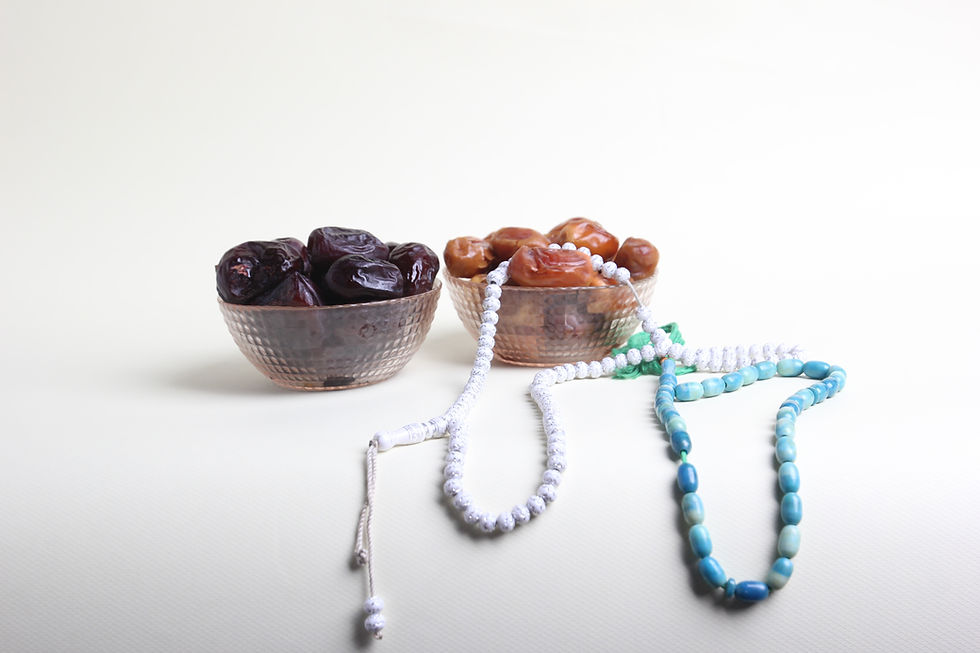Eating for Fertility During Ramadan: A Dietitian’s Guide
- dahlia504
- Feb 23, 2025
- 3 min read
Author: Dahlia Abou El Hassan, MScFN, RD
Ramadan is a sacred time of fasting, reflection, and spiritual renewal. However, if you are trying to conceive, maintaining balanced nutrition during Ramadan is essential to support your fertility health. As a dietitian specializing in fertility nutrition, I want to provide guidance on how to nourish your body optimally while observing this holy month.

Prioritizing Nutrient-Dense Suhoor (Pre-Dawn Meal)
Suhoor is your chance to fuel your body for the fasting hours ahead. Eating a well-balanced meal can help sustain energy levels, support hormonal balance, and optimize reproductive health.
Protein-Rich Foods: Include eggs, Greek yogurt, or legumes (chickpeas, lentils) to support egg and sperm health.
Complex Carbohydrates: Choose whole grains like oats, quinoa, or whole wheat toast to provide sustained energy and regulate blood sugar levels, which are crucial for hormonal balance.
Healthy Fats: Avocados, nuts, and seeds (chia, flaxseeds) offer essential omega-3 fatty acids, which support ovulation and improve sperm quality.
Hydration: Drink plenty of water and incorporate hydrating foods like cucumbers and watermelon to prevent dehydration, which can affect cervical mucus production.
Example Dishes: Overnight chia pudding with milk and berries, whole wheat toast with avocado and boiled eggs, or a smoothie with Greek yogurt, banana, and flaxseeds.
Breaking Your Fast: A Balanced Iftar for Fertility
Iftar is a time to replenish nutrients and rehydrate. Opting for fertility-friendly foods can help restore energy and support reproductive function.
Break Your Fast with Dates and Water: Dates provide quick energy and essential minerals like magnesium, which support hormone production.
Protein and Healthy Fats First: Start with lean protein sources such as fish, poultry, or plant-based options like tofu. Include healthy fats like olive oil and nuts to help regulate ovulation and support egg quality.
Slow-Digesting Carbs: Brown rice, quinoa, or sweet potatoes provide steady energy and help maintain stable blood sugar levels, reducing inflammation linked to fertility issues.
Load Up on Antioxidants: Colorful fruits and vegetables, such as berries, spinach, and bell peppers, provide antioxidants that protect eggs and sperm from oxidative stress.
Example Dishes: Lentil or vegetable soups for hydration, grilled salmon with quinoa and roasted vegetables.
Smart Snacking for Sustained Energy
Between Iftar and Suhoor, small, nutrient-dense snacks can help stabilize blood sugar levels and provide key fertility nutrients.
Greek yogurt with walnuts and honey for probiotics and omega-3s.
A handful of almonds and pumpkin seeds for zinc and vitamin E, vital for reproductive health.
Hummus with veggie sticks for protein and fiber to support digestion and hormone regulation.
Khoshaf (dried fruit and nut compote) as a natural sweetener rich in fiber and healthy fats.
Example Dishes: A small bowl of chia pudding, nut and date energy balls, or whole grain crackers with cheese.
Staying Hydrated
Dehydration can impact cervical mucus and overall fertility health. Aim for at least 8–10 cups of water between Iftar and Suhoor. Herbal teas such as peppermint or ginger can support digestion and reduce bloating. Consider incorporating electrolyte-rich drinks, such as coconut water or homemade electrolyte solutions with fruit juice, water, and a pinch of salt, to replenish minerals lost during fasting.
Meal Planning Tips for a Stress-Free Ramadan
Planning your meals ahead of time can help you maintain a nutritious diet without feeling overwhelmed.
Prepare Overnight Meals: Make chia pudding, smoothie packs, or overnight oats for a quick and easy Suhoor.
Batch Cook and Freeze: Prepare soups, stews, and grilled proteins in advance to simplify Iftar preparation.
Use a Meal Plan: Write out a weekly menu with balanced meals, so you’re not scrambling for nutritious options last minute.
Incorporate Variety: Rotate different grains, proteins, and vegetables to ensure a diverse intake of fertility-supporting nutrients.
Cook Extra for Leftovers: Make larger portions of meals to have nutritious options readily available for the next day, reducing meal prep stress and ensuring you stay nourished.
Exercise During Ramadan
Staying active during Ramadan can support circulation, energy levels, and overall fertility. Light to moderate exercise, such as walking, yoga, or stretching, is recommended, especially before Iftar or a few hours after breaking your fast. Avoid high-intensity workouts during fasting hours, as dehydration and fatigue may impact recovery. Listening to your body and adjusting your routine as needed can help maintain movement while fasting.
Listening to Your Body
If fasting becomes physically challenging, particularly if you have underlying health conditions affecting fertility (such as PCOS or endometriosis), consult a healthcare provider or religious authority about possible exemptions or modifications.
Final Thoughts
With thoughtful meal planning, it is possible to support fertility while observing Ramadan. Prioritize nutrient-rich foods, stay hydrated, and listen to your body’s needs. Wishing you a healthy and blessed Ramadan!









Comments